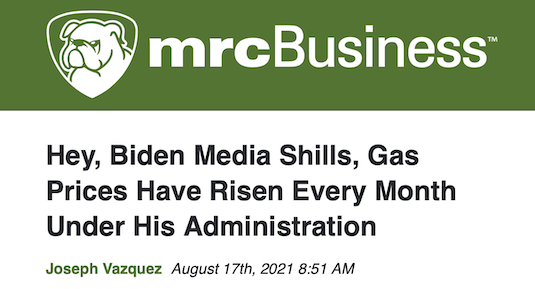We’ve noted the desperate attempts by the Media Research Center’s Joseph Vazquez to blame higher gas prices on President Biden, despite a lack of evidence to support the claim. He’s still at it. He huffed in an Aug. 11 post:
The Associated Press (AP) found a way to make President Joe Biden look like an American prophet warning about rising energy prices, without mentioning how his anti-oil agenda is contributing to the growing crisis.
AP ran a puff story headlined, “Biden administration sounds alarm on rising energy prices.” The lede paragraph was just as ridiculous: “President Joe Biden’s administration is raising alarms at home and abroad about rising energy prices slowing the nation’s recovery from the pandemic-induced recession.” GasBuddy Head of Petroleum Analysis Patrick De Haan argued in April that Biden’s energy plan was contributing to rising gas prices.
As we pointed out, De Haan cited no specific policy that was solely responsible for the rise in gas prices, which less biased observers have argued is more accurately blamed on a reduction in crude oil production during the pandemic and global demand generated by world economies come back to life.
On Aug. 13, Vazquez gushed once more over his favorite accused sexual assaulter, Fox Business’ Charles Payne, touting how he “placed the blame for spiking energy prices right at the feet of President Joe Biden’s fossil fuel ‘war.'” Again, no specific policy was cited; instead, Payne was allowed to uncritically rant that “West Texas Intermediate oil, ‘a week ago, was $75 a barre[l]’ compared to ‘$35 a barrel’ on Nov. 2, 2020” — completely and dishonestly omitting the pandemic’s effect on the economy that drove down oil prices last year.
In an Aug. 17 post, Vazquez played the correlation-equals-causation fallacy:
The terrible effects of President Joe Biden’s war on fossil fuels are taking a serious toll on the nation as the left-wing media have consistently attempted to defend him from bad press.
U.S. Energy Information Administration data revealed that gas prices per gallon were at about $2.42 when former President Donald Trump left office. Under Biden, prices have increased every single month to a discomforting $3.23, a 33.47 percent increase. The gas data follow a hot Consumer Price Index (CPI) and Producer Price Index (PPI), both key inflation indicators released by the Bureau of Labor Statistics (BLS). The New York Post reported in a recent story on the CPI data that gasoline prices had risen “2.4 percent from May and is now up almost 42 percent from a year ago.”
[…]The media have consistently played the role of lapdogs for Biden’s agenda by gaslighting and hoodwinking viewers and readers on Biden’s culpability concerning rising prices.
Vazquez again invoked De Haan’s dubious reasoning. And like DeHaan, Vazquez identified no specific policy that is directly linked to rising prices.
Vazquez ranted in an Aug. 19 post otherwise attacking New York Times economist Paul Krugman:
Biden’s actions enabled an economic crisis by allowing the Organization of the Petroleum Exporting Countries (OPEC) to gain “more leverage over U.S. gas prices, especially Saudi Arabia.” Biden all but begged OPEC to produce more oil while U.S. production remains stagnant. A climate agenda that hamstrings the U.S. economy by subjecting it to foreign oil cartel manipulation was clearly lost on Krugman.
This time, though, Vazquez actually cites someone who could be a credible expert to back him up: “Transversal Consulting President Ellen Wald Ph.D. reportedly told Axios that President Joe Biden’s climate agenda has kept ‘American [oil] production down.'” You know Vazquez is desperate to pump up someone’s credibility by adding Wald’s doctorate degree to her name.
But Wald has also cited another reason gas prices are high, one that has nothing to do with Biden. Marketplace reported in June:
But Ellen R. Wald at the Atlantic Council’s Global Energy Center said oil prices are up because of what’s going on in the U.S.
“The really big story, I think, about what’s helping keep prices rising is that American production hasn’t come back to the same levels that it was in 2020,” Wald said.
Shareholders are demanding a return on investment, Wald said, which has led U.S. producers to reduce spending and keep output flat.
That’s an explanation Vazquez will never report to his readers.
